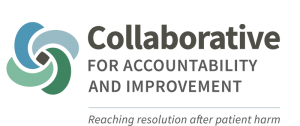Tools and Resources[ Show all or clear results ]
Learning Community
Resources associated with CAI Learning CommunityPresentation/Webinar
Recorded webinars and presentationsVideo
CRP related video, movieCAI Webinar: CRPs: Why the insurance industry hasn’t embraced them . . . and why it should
Resources associated with CAI Learning Community
Recorded webinars and presentations
CRP related video, movie
Decription
CRPs: Why the insurance industry hasn’t embraced them . . . and why it should presented by Richard Boothman, JD
The driving ideas behind CRPs continue to draw interest and debate, now twenty years after Steve Kraman and Ginny Hamm published their Lexington, KY VA experience with “Extreme Honesty”. After more than 17 years, the University of Michigan continues to draw attention transparent with their “Michigan Model”, the most successful and longest continual example of a principled, and proactive approach to patients injured in unexpected clinical outcomes. After years of balking at abandoning “deny and defend” more health systems around the country and around the world are exploring the transition, but a skeptical insurance industry continues to hold back and sometimes, frustrate the desires of their insureds to move in this direction. Why? Is the industry’s skepticism well-founded and prudent? Or is it missing a valuable opportunity?
Rick Boothman, the architect of the “Michigan Model” will initiate a long-deserved discussion into this topic. His experience suggests that there are multiple insurance advantages in the CRP approach and the insurance industry should rethink old beliefs, practices and prejudices and embrace this model.
Outline
- Insurance 101 – a dummy’s guide to the construct
- True CRPs – the essential elements and how the model differs from “deny and defend”
- What holds the insurance industry back from jumping on board?
- What is the insurance industry missing and why should it matter?
Learning Objectives
- That too many equate CRPs only with selective, early resolution of potential and asserted claims – what are the essential elements that distinguish a true CRP from established, traditional risk management practices?
- What are the unique outcomes of a CRP and why do they matter?
- Why a CRP better serves the interests of healthcare insureds?
- What unique consequences of a CRP would benefit the insurance industry especially?
